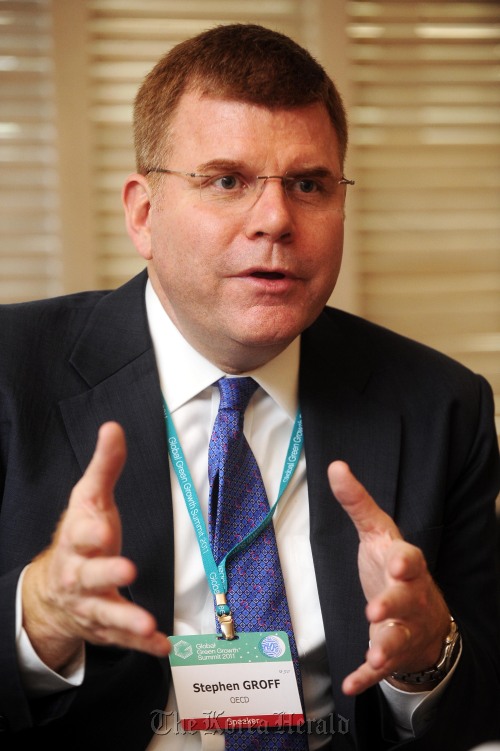The Organization for Economic Cooperation and Development, which provides advice and guidance to donor countries on aid programs to developing nations, is Korea’s key partner in formulating green growth strategies as well.
The OECD’s Development Cooperation Directorate tracks aid performance of the OECD member nations, the volume and effectiveness of their aid programs, undertakes peer reviews, or evaluates the performance of individual countries every five years.
Korea became a member of the OECD’s Development Assistance Committee in 2010 and is set to receive its first peer review next year.
“We need to make sure that the green growth policy we take has inclusive growth, that benefits the poor, in the context of development,“ Stephen Groff, deputy director of the OECD directorate said in an interview with The Korea Herald on the sidelines of the two-day Global Green Growth Summit in Seoul that closed on Wednesday.
Groff was invited as a speaker at a GGGS session titled “Towards better development cooperation: HLF-4, G20 and MDGs” on Wednesday.
He pointed to two stylized facts to put the G20 development agenda into context.
“The first stylized fact to consider is that emerging economies have become the stronger driver of global growth since 2000,” he said.
 |
Stephen Groff |
“While during the 1990s, the G7 countries led growth in developing countries, in the course of the 200s, the impact of the emerging economies’ growth on both the low- and middle-income countries has risen significantly.”
The second stylized fact to consider is the geography of poverty.
“A number of the large countries that have graduated into the middle-income countries’ category and that display high rates of growth still have large number of poor people,” the U.S. analyst said.
“Several monetary, nutritional and multidimensional poverty measures suggest that about three-quarters of the world’s poor ― or almost one billion poor people ― now live in the MICs.”
So, while growth is a necessary condition for poverty reduction and development, high-growth rates can still go hand-in-hand with large pockets of poverty, according to Groff.
“This has significant implications for the debate on international cooperation, both for traditional DAC donors and emerging economies: What is the most effective mix of instruments ― aid, trade and investment ― to support MICs in their attempts to reduce poverty?”
Groff’s directorate looks at sector policies in the way donors engage with developing nations such as climate change, green growth, gender equality, governance and anticorruption.
The biggest issue coming up now is the Fourth High-Level Forum on Aid Effectiveness to be held in Busan in late November.
“Our journey that started on the notion that aid alone is not enough and that aid effectiveness is very important ends, in a way, at the HLF-4 in Busan where we will look back on the work done over the past five years,” Groff said.
The OECD brings in policy experts for the capitals of member nations for discussions to build knowledge and guidance on how to use overseas development aid.
Korea’s ODA last year surpassed $1 billion for the first time, recording $1.168 billion, or 0.12 percent of the country’s gross national income. The target is to reach 0.25 percent of the GNI by 2015.
By Kim So-hyun (
sophie@heraldcorp.com)








